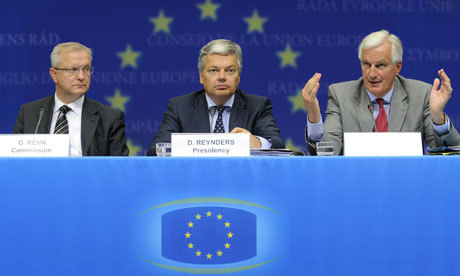EU Finance Ministers Seek Progress on 'Banking Union'

EU finance ministers will try Tuesday to take the next step toward "Banking Union," the new common rules meant to ensure banks help the economy, not destroy it through reckless risk-taking.
The aim appears simple but putting the system in place is politically fraught given the huge additional powers Brussels could acquire.
"We have worked hard to get a political agreement to get banking supervision, including the restructuring mechanism, off the ground this year," German Finance Minister Wolfgang Schaeuble said Monday.
"It is still possible to do this," Schaeuble added, but he could not rule out another ministerial meeting before EU leaders gather December 19-20.
The finance ministers must first agree the scope and operating regime for a Single Resolution Mechanism (SRM) to wind up failing banks which will at this stage be run by the European Commission, the EU's executive arm.
The SRM will work alongside an already agreed Single Supervisory Mechanism under the European Central Bank which will oversee the largest banks directly, and the smaller lenders indirectly via national authorities.
The SSM, which non-euro countries can ask to join, becomes operational late next year after the ECB vets the largest banks to see if they are strong enough on their own or need fresh capital.
The ECB insists the SSM and SRM should start at the same time, since if the review finds a bank to be at risk, it is the SRM, under the Commission, that will step in to stabilize or close it.
Germany however has been hostile to the Commission having such authority to direct the SRM and would prefer member states to have the main say.
With little apparent support for that option, seen elsewhere as too slow and unwieldy, Berlin has been pressing for ways to ensure oversight of the SRM managing board.
After months of disagreement, Schaeuble suggested Monday that Berlin was ready to compromise but gave no hint of what the deal entailed.
"We need to do it in such a way as to avoid conflicts of interest within the Commission but I think there will be solutions," he said.
If control of the SRM can be agreed, the next issue is funding.
In principle, it is the banks which must pay into an SRM fund -- thereby taking the taxpayer out of the loop -- but it will take years to build up to a sufficient size.
Meanwhile, the ECB's 2014 review could find banks needing immediate help which will have to come from an interim 'back-stop' system involving governments, bank shareholders, creditors and eventually large depositors.
A last option is recourse to the eurozone's own rescue fund, the European Stability Mechanism set up to bail out member states.
A further divisive problem is the scope of the SRM.
For EU powerhouse Germany, it is simplest if the SRM covers the same banks overseen directly by the ECB -- that is, nearly 130 lenders holding about 85 percent of all eurozone banking assets.
France believes all 6,000 eurozone banks should be included because it is often the smaller lenders which get into trouble first, bringing down their larger peers.
SRM supporters hope for an accord Tuesday so it can be finalized by EU leaders later this month, giving the European Parliament time to approve it before elections in May.
If that timetable slips, then the whole Banking Union framework could hang fire.
"There is a great sense of urgency to get an accord, "Dutch Finance Minister Jeroen Dijsselbloem said Monday after chairing a meeting of his eurozone peers.



